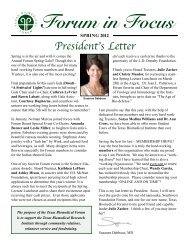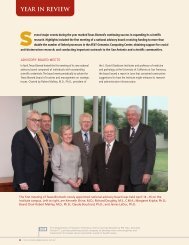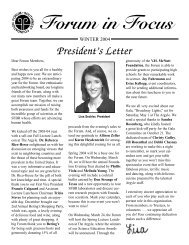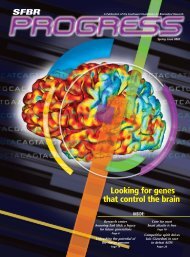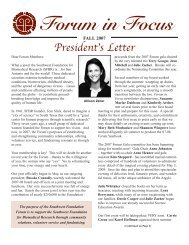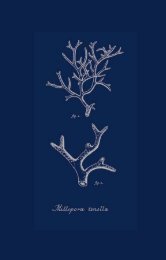Texas Biomed Science Report 2011-2012 - Texas Biomedical ...
Texas Biomed Science Report 2011-2012 - Texas Biomedical ...
Texas Biomed Science Report 2011-2012 - Texas Biomedical ...
You also want an ePaper? Increase the reach of your titles
YUMPU automatically turns print PDFs into web optimized ePapers that Google loves.
Robert Shade, Ph.D.<br />
Associate Scientific Officer<br />
The research team received a renewal of a major 3-year grant from the<br />
G. Harold & Leila Y. Mathers Charitable Foundation in <strong>2011</strong>. This is a<br />
multi-institutional project that includes investigators at the University of<br />
<strong>Texas</strong> Health <strong>Science</strong> Center San Antonio, Duke University, Princeton<br />
University and the University of Melbourne in Australia. The major<br />
objective of this research program is to define the neural mechanisms<br />
that contribute regulation of ingestive behavior such as salt, water or food<br />
intake. The recent observation by this group that salt depletion promotes<br />
activation of gene networks in the hypothalamus of the brain in rats<br />
and mice that have previously been associated with addictive behavior<br />
has opened a new direction for this research in baboons. Studies that<br />
are currently in progress will explore whether salt and food appetites<br />
in baboons can be attributed to activation of these gene networks.<br />
This research program also initiated a new collaborative study with<br />
the Institute of Surgical Research (ISR) and Brooke Army Medical<br />
Center during the last year. The ISR group uses a lower body negative<br />
pressure procedure in human subject studies as a surrogate for the<br />
cardiovascular effects that occur with blood loss that is sufficient to<br />
cause decreases in blood pressure. This research has demonstrated that<br />
20-30 percent of their test subjects have a low tolerance for LBNP.<br />
This is similar to the 20-30 percent of trauma induced blood loss<br />
cases where it is difficult to maintain adequate blood pressure with<br />
resuscitation treatment. However, the cardiovascular effects of LBNP<br />
have never been directly compared to cardiovascular effects of blood<br />
removal. The collaborative study will accomplish this comparison using<br />
anesthetized baboons for the study subjects. The protocol development<br />
has shown that some baboons are extremely tolerant of LBNP and some<br />
are not tolerant. The ultimate goal of this research at ISR is to develop<br />
Staff<br />
Left to right: Magdelena<br />
Garcia-Forey, Robert Shade,<br />
James Mubiru<br />
<strong>2011</strong>–<strong>2012</strong> Scientific <strong>Report</strong><br />
“My research focuses on the interaction between diet composition and genetic factors in cardiovascular<br />
regulation. Currently active research projects have been designed to determine how dietary salt, fat<br />
and carbohydrate content and genetic influences contribute to the risk for changes in cardiovascular<br />
regulation that contribute to complex metabolic diseases.”<br />
Publications<br />
• Higgins PB, Bastarrachea RA, Lopez-Alvarenga JC, Garcia-Forey M, Proffitt JM, Voruganti<br />
VS, Tejero ME, Mattern V, Haack K, Shade RE, Cole SA, Comuzzie AG (2010) Eight week<br />
exposure to a high sugar high fat diet results in adiposity gain and alterations in metabolic<br />
biomarkers in baboons (Papio hamadryas sp.). Cardiovasc Diabetol 9:71.<br />
• Mubiru JN, Cavazos N, Hemmat P, Garcia-Forey M, Shade RE, Rogers J (<strong>2011</strong>) Androgen<br />
receptor CAG repeat polymorphism in males of six non-human primate species. J Med<br />
Primatol. Oct 7.<br />
• Mubiru JN, Garcia-Forey M, Cavazos N, Hemmat P, Dick EJ Jr, Owston MA, Bauer CA,<br />
Shade RE, Rogers J. (<strong>2011</strong>) Serum prostate specific antigen changes in cynomolgus<br />
monkeys (Macaca fascicularis) on a high sugar high fat diet. Prostate. Jun 28.<br />
• Mubiru JN, Garcia-Forey M, Higgins PB, Hemmat P, Cavazos NE, Dick Jr. EJ, Owston MA,<br />
Bauer CA, Shade RE, Comuzzie AG, Rogers J (<strong>2011</strong>) A preliminary report on the feeding of<br />
cynomolgus monkeys (Macaca fascicularis) with a high-sugar high-fat diet for 33 weeks.<br />
J Med Primatol 40(5):335-41.<br />
new technologies that will identify those individuals who have low<br />
cardiovascular reserves and need special attention in trauma situations.<br />
We also provide laboratory resources for a staff scientist in the<br />
Southwest National Primate Research Center, James Mubiru, Ph.D.<br />
Mubiru is funded by an NIH Mentored Research Development Award.<br />
The objective of his research is the development of nonhuman primate<br />
models of prostate disease. In this research he has shown that male<br />
baboons and macaques have serum prostate specific antigen (PSA)<br />
levels that increase with age similar to what occurs with aging in men.<br />
Mubiru has recently shown that PSA levels decrease in cynomolgous<br />
macaques as body mass index (BMI) increases with a high fat/ high<br />
carbohydrate diet. Since PSA levels are lower in men with a high<br />
BMI these results suggest that cynomolgous macaques are a valid<br />
model for investigating the relationship between PSA and BMI.<br />
E For more information, please visit www.txbiomed.org/primate-researchcenter/primate-research-center-staff-bio?u=18<br />
41



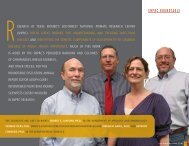
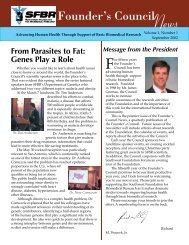
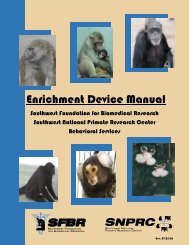
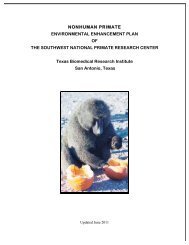
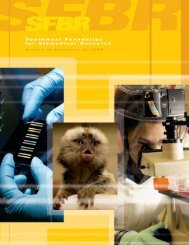
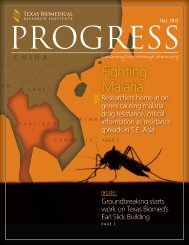
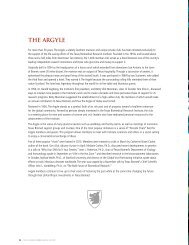
![Vol. 8 No. 2, 2011 [PDF] - Texas Biomedical Research Institute](https://img.yumpu.com/35688099/1/190x245/vol-8-no-2-2011-pdf-texas-biomedical-research-institute.jpg?quality=85)
